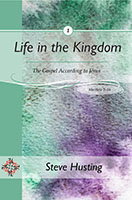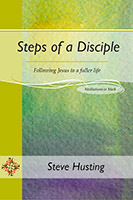In a Bible study I attended, we read a chapter ahead of time and jotted down our impressions. Then we met and shared our findings as we were called upon. In this way we marched through the Bible chapter by chapter in order. Many who participated found something pertinent in what they studied that applied to their current life situation.
Perhaps you have never read the Bible in a way that would make sense to you. Let me give you a practical way to read the Bible. Following this format, you may be surprised to find God working in your life. Some newcomers who are not Christians were asked to just follow these steps and they have discovered God on their own – and gained the value for reading the Bible themselves.
Some people follow this method of Bible study daily. Three steps are involved. Let’s take them in order.
Chapter breakdown
First we read the chapter from beginning to end, just like we would for any other book. (Also like any other nook, we start at the beginning of the book.) Each chapter has passages divided up into numbered sections called verses. As you read the chapter, pay attention to natural divisions. Then jot down those divisions and summarize them. Note every division so every passage has been included. Try not to skip this step. It’s purpose is to help you consider a passage in its own context. Yep – people misunderstand the Bible because they take verses out of context. (Many modern Bibles already break up the chapters with suheadings. Ignore those and make up your own.) Here is an example.
1 Corinthians 3 Sample Chapter Breakdown
1-4 Paul considered them to be babes in Christ, carnal, not spiritual. (They had set one minister of God as better than another and divided the church.)5-7 Paul and Apollos are merely ministers. (So the Corinthians should not divide the church over them.)
8-10 Paul had his work and Apollos had his. They are equally valuable and work together.
11-13 We build our faith on Jesus, not on his ministers.
14-17 We will be rewarded or not based on our results – what we did with Jesus …
18-23 … So don’t boast in men, but in God.
Meaning
In this phase we ask ourselves, “What does this mean to me?” Go back over the chapter and see if there is any section that stands out. Think about what it is saying. Write down your thoughts in a few sentences. Many people find this one of the most important parts of their study.
Application
On this final step we ask ourselves, “What am I going to do about it?” Here is where you consider what action to take based on what you wrote. This is one of the most important steps and one people neglect the most – responding to what they read.
If you are one of those who think the Bible has nothing to offer for daily life, try the steps above for a whole book and see if it changes your life for the better. Just start with the gospel of Matthew (look it up in your Bible’s Table of Contents if you have to) and work your way through the Bible from there.
Why should it change our lives? Because the Bible is the means through which God himself communicates to us. When you respond to his Word, then God responds in kind.
What Do You Think?
a. If the Bible is the most important book in the world – because through it God speaks to us – should we study it carefully? Why or why not?
b. Will the Bible change our lives if we did not respond to it’s teachings? What does that say about the importance of our involvement?






